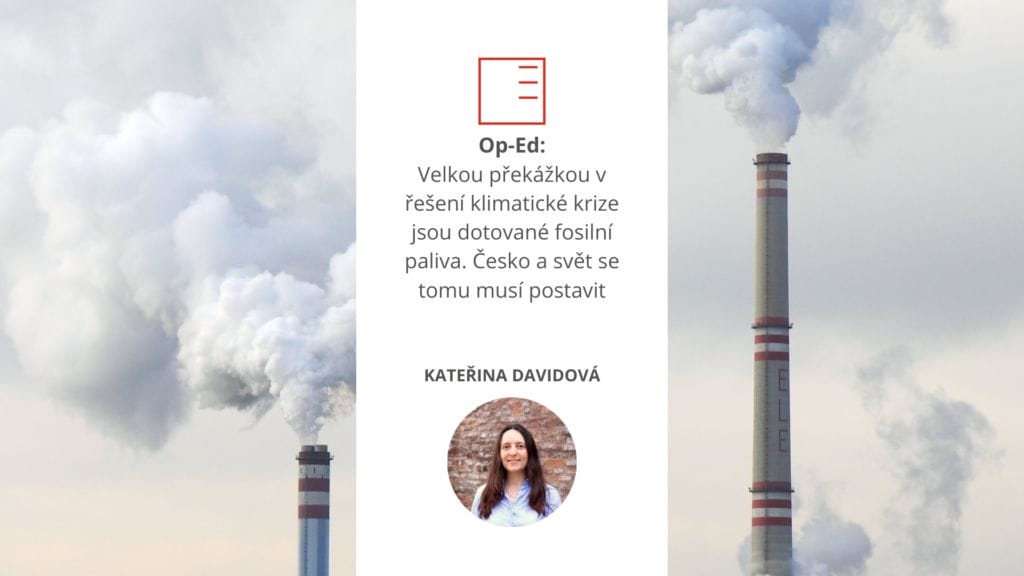Op-Ed | Subsidised fossil fuels are a major obstacle to solving the climate crisis. The Czech Republic and the world must confront it

One of the biggest obstacles to solving the climate crisis is fossil fuel subsidies. However, they have not received much attention in the Czech Republic. More people probably know about the renewable energy subsidy than the billions of public money spent each year on supporting fossil fuels such as coal, gas and oil.
At the end of November, the most anticipated climate conference of the year, COP28, will begin in Dubai. World leaders will be trying to move forward in negotiations on how to reduce global greenhouse gas emissions. Together, effectively and fairly. And one of the issues likely to resonate more this year than in previous years will be fossil fuel subsidies.
Indeed, the new European Commissioner for Climate Action, Wopke Hoekstra, recently committed to fossil fuel subsidies. During his speech to the European Parliament, he promised to focus on phasing out support for fossil fuels from the common European budget.
It would be a major step forward if the issue really gets to the top of the agenda, whether at the international or European level. Although almost all countries in the world committed to "phasing out inefficient fossil fuel subsidies" at the 2021 climate conference in Glasgow, according to OECD data, global fossil fuel subsidies have only declined marginally over the past decade, from 1.2 per cent of global GDP in 2012 to 0.8 per cent of global GDP in 2021. Then came 2022 and the global energy crisis, when fossil fuel subsidies rocketed to double the previous year's level.
So there is no question that subsidies are not ending fast enough. Because of extremely high energy prices and the efforts of governments to support domestic consumers, the current trend is even going completely against what experts consider necessary to keep global warming within relatively safe limits.
According to the International Energy Agency, renewable energy generation capacity needs to triple globally by 2030 to achieve climate neutrality. However, as recently as 2021, twice as much money was spent globally on supporting fossil fuels than on supporting renewables.
It goes without saying that supporting the most vulnerable households at a time of record high energy prices was desirable in terms of maintaining social harmony. However, many governments have applied for the support across the board, and instead of targeted support for insulation, renewables and an overall reduction in energy consumption, they have merely matched expensive market prices, helping fossil fuel corporations to record profits. Cutting off harmful fossil subsidies will thus be even harder now than before 2022.
Subsidising fossil fuels from the national budget is unsustainable and uneconomic. At a time when the Czech government is struggling to straighten out its public finances and proposing cuts in vital societal areas such as education and healthcare, fossil fuel subsidies are not a justifiable expense.
The burning of fossil fuels has many negative side effects for which the state will sooner or later pay. First and foremost are the aforementioned greenhouse gas emissions, which cause global temperature increases and associated phenomena such as increasingly frequent droughts, floods and extreme weather events. However, they are also responsible for the emission of other harmful substances and dust particles that have a negative impact on air quality and human health. According to a study by Harvard scientists, the burning of fossil fuels is responsible for the deaths of one in five people in the world. In the Czech Republic, this would be equivalent to 25 000 deaths a year. Hundreds of thousands more suffer from long-term respiratory problems.
Fossil fuel subsidies are also economically inefficient. If, on the one hand, we spend money on supporting the development of renewable energy sources or on adaptation to climate change, and, on the other, we continue to support the burning of fuels that cause these problems, we cannot talk about sensible management.
If we look specifically at the Czech Republic, in 2021 (i.e. before the significant increase in energy prices), more than CZK 220 billion went to support fossil resources. By comparison, the popular subsidy programme for renewable energy and insulation, Nová zelená úsporám, has an allocation of CZK 39 billion for the period 2021 to 2030, and the programme for low-income households Nová zelená úsporám Light has CZK 3 billion earmarked.
Perhaps an even bigger problem is that the Czech Republic has no clear definition of fossil fuel subsidies, and, for example, its National Energy and Climate Plan (NECP) relies on a rather narrow definition that omits a number of important incentives. However, we know that in the Czech Republic, most subsidies still flow to coal. This is followed by oil, diesel and natural gas.
So if we really want to come close to a chance of limiting global warming to an acceptable level, we need to quantify these subsidies realistically and take action to end them. The conference in Dubai will hopefully provide new impetus to address this issue.





